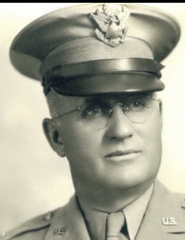Miles Sees Foe From Observation Point at Front
By FRANK MILES)
(Iowa Daily Press War Correspondent)
With the Fifth Army in Italy (IDPA) -- German machine gunners and infantrymen were behind the next ridge, 700 yards away, battalion commander of the 168th Infantry, told me when I joined him in the old stone house he was using for an observation post.
American doughboys of his company were dug in on the side of the ridge we could see, easily visible with naked eye and clear as the headlines in this newspaper through binoculars.
Two soldiers had been wounded in the house by shrapnel, which burst through the windows a few hours before.
Jack Bell, one-armed correspondent for the Miami Daily Herald, Lt. Harrison Harding, of Des Moines, and I, and another 168th battalion commander, reached the place from the rear after walking across a shell-pocked area, which resembled the bowl of a huge stadium.
Seven tank destroyers emplaced in it were firing constantly and being fired on intermittently.
PFC. Helmer Bruehahn, Monona, jeep driver of the destroyer outfit, and I shook hands at the post.
We reached this hot sector in a jeep over a route through trees from a town, which was a mass of ruins.
A company command post was there in a cellar lighted by candles.
While I talked with some of the GI's, Jerry shells finished leveling one house and crunched in dirt nearby.
En Route from another 168th outpost we saw and smelled several dead German bodies.
At the post, which was an aid station for wounded men were: PFC. Howard Sican, Monticello, who had fought through Africa and Italy, wore the same bronze star and been wounded at Anzio; T/5 Ralph Mead, Rhodes, who had like service and was wounded at Cassino; and T/5 Harold Johnson, Coon Rapids.
We went there from a sand bagged battery reconnaissance point just below the remains of an old castle stop a lofty mountain peak from which they country could be viewed for miles around. In charge was a second lieutenant whose commander was Capt. John Walter, of Ottumwa, who then was off duty with a fractured toe caused by a falling rock.
Bombers and fighters flew back and forth dropping explosive eggs amid the nazi flak. Flames of smoke from them and American projectiles in enemy territory made the numerous white and black blotches against the blue horizon. It was an interesting day.
Source: Muscatine Journal News-Tribune, November 28, 1944
![]()

